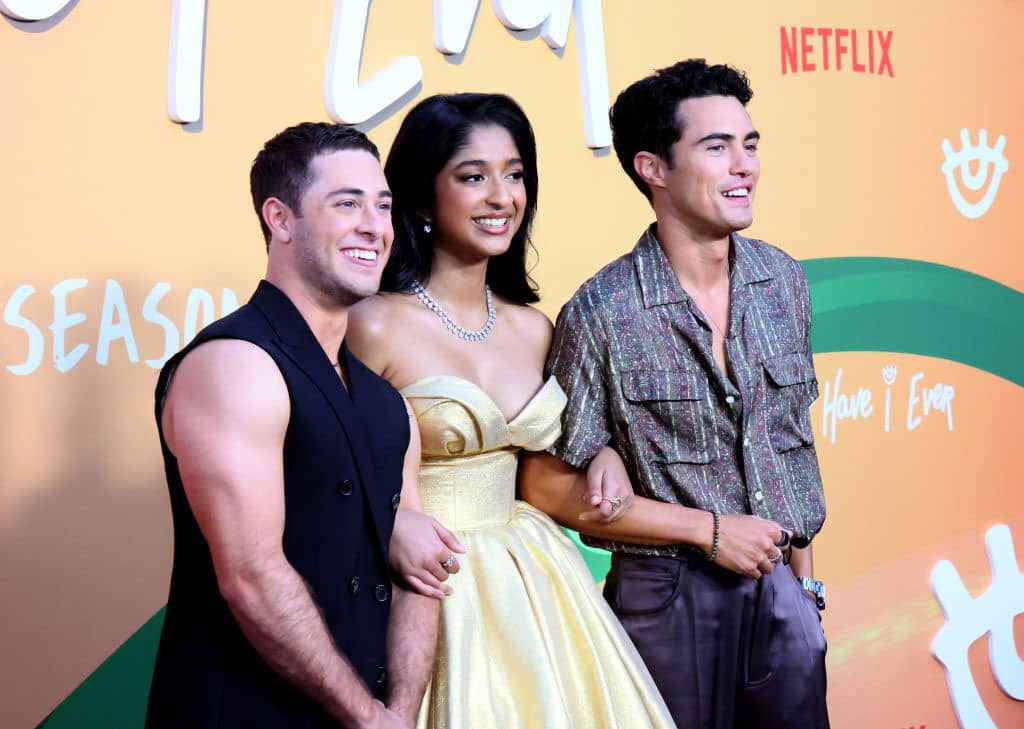 (L-R) Jaren Lewison, Maitreyi Ramakrishnan and Darren Barnet attend Netflix’s “Never Have I Ever” season 4 premiere at Westwood Village on June 01, 2023 in Los Angeles, California. (Photo by Rodin Eckenroth/Getty Images for Netflix)
(L-R) Jaren Lewison, Maitreyi Ramakrishnan and Darren Barnet attend Netflix’s “Never Have I Ever” season 4 premiere at Westwood Village on June 01, 2023 in Los Angeles, California. (Photo by Rodin Eckenroth/Getty Images for Netflix) “Never Have I Ever” is an impressive show that does many things well: It’s a great representation of a tight-knit Indian-American family; it normalizes therapy; delves into dealing with the grief of losing a family member and features writing that is both absurdly funny and deeply moving. Plus, the acting is tremendous. The fourth and final season is now streaming on Netflix.
Maitreyi Ramakrishnan’s performance as Devi Vishwakumar, a Sherman Oaks high school student, might be the best high school character in the history of TV; her comedic timing and charisma are unprecedented. The show, co-created by Mindy Kaling and Lang Fisher, also boasts phenomenally rich performances in other roles. Poorna Jagannathan is on point as Nalini, Devi’s mother, a dermatologist who believes in tough love and needs her daughter to focus on her education, but knows she can’t be too hard on her. Richa Moorjani is excellent as Kamala, Devi’s older cousin who is staying with the family while in college. There’s also Ranjita Chakravarty as the hilarious grandmother, Nirmala, who this season dates a Jewish man named Len, in a role smartly played by Jeff Garlin of “Curb Your Enthusiasm” fame. Devi’s friends include Fabiola Torres (played by Lee Rodriguez), a young woman who is skilled in robotics and discovers she is attracted to women, and Eleanor Wong (Ramona Young), who has dreams of being an actress. Rodriguez and Young are both knockouts in their roles.
But the sticking point was Ben Gross, a rich Jewish brainiac played by the talented Jewish actor Jaren Lewison. The last season relegated him to becoming constipated because he is so neurotic and literally full of crap. His character felt terribly underwritten.
As the fourth season begins, Devi and Ben have slept together; it was Devi’s first time, and rather than talking, cuddling or being comforting, Ben tells her to take an Uber home. As if that’s not bad enough, he gets horrible advice from former Laker Dwight Howard, who tells him he needs to date someone else.
I understand that writers want characters to grow, but Ben was written as a stereotype, which did not allow Lewison to show his full potential. As the show concludes, the writers give Ben the ending he deserves, while equipping him some guts and finally some street-smarts to go with his book-smarts.
He defends Devi when a creep accosts her on the dancefloor, he baldly lies to Devi, telling her his new girlfriend has forbidden him from seeing her; in the end, he realizes that he has to take a risk, no matter the result. The final season follows Devi and her friends as they apply to college. Devi wants to go to Princeton, Ben wants to go to Columbia, Fabiola wants to go to Princeton or Howard University and Elanor wants to go to Juilliard.
Tennis star John McEnroe is an odd choice but excellent as the off-screen narrator, who explains some of Devi’s thoughts and desires. The show is groundbreaking in the way it shows Devi’s difficulty in dealing with the death of her father, Mohan. Devi also has to balance academics and her culture with wanting to fit in and have boyfriends. This season, she gets involved with Ethan (Michael Cimino) a bad boy she is attracted to, but has to decide if she can handle his lack of brains.
The show allows Devi to make mistakes and learn from them. It portrays youth who are dealing with pressure and difficulties, and learning they have the power to change their fate. “I think the beauty of the show is just how human the characters are,” Ramakrishman said at a panel at the 92nd Street Y in Manhattan last week, adding that her grandmother in real life was “die-hard Team Ben.”
The show also deals with the reality that those who were popular in high school can feel lost when they go to college. That is the case with Paxton Hall-Yoshida (Darren Barnet), a popular, handsome boy who discovers details of his Japanese ancestry and wants to be seen as more than a guy with good looks.
After the high-school caricatures of “Saved By The Bell” or “Beverly Hills 90210,” “Never Have I Ever” is notable for its realism. That the show even deals with a widow’s desire to find love again is laudable. The latter portion of “Never Have I Ever” shows Ben urging Devi to write an essay that she for Princeton, and while they both have romantic feelings for each other, the question is whether or not they will act on it again.
Lewison likely has a bright future in Hollywood if he wants it. Ramakrishman should be a mega-star. “Never Have I Ever” comes at an important time, as high school students need to be aware of mental health issues and not be afraid of any stigma, as well as a time when inclusion and diversity needs to be celebrated. It’s a show that should be loved by different age groups and people of different backgrounds.






















 More news and opinions than at a Shabbat dinner, right in your inbox.
More news and opinions than at a Shabbat dinner, right in your inbox.